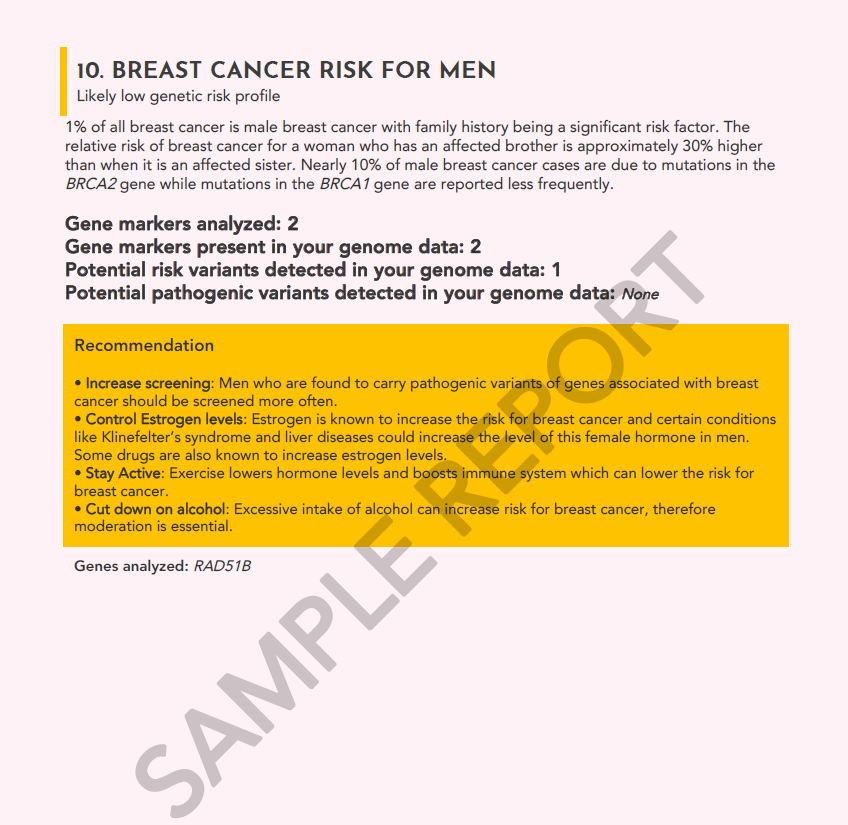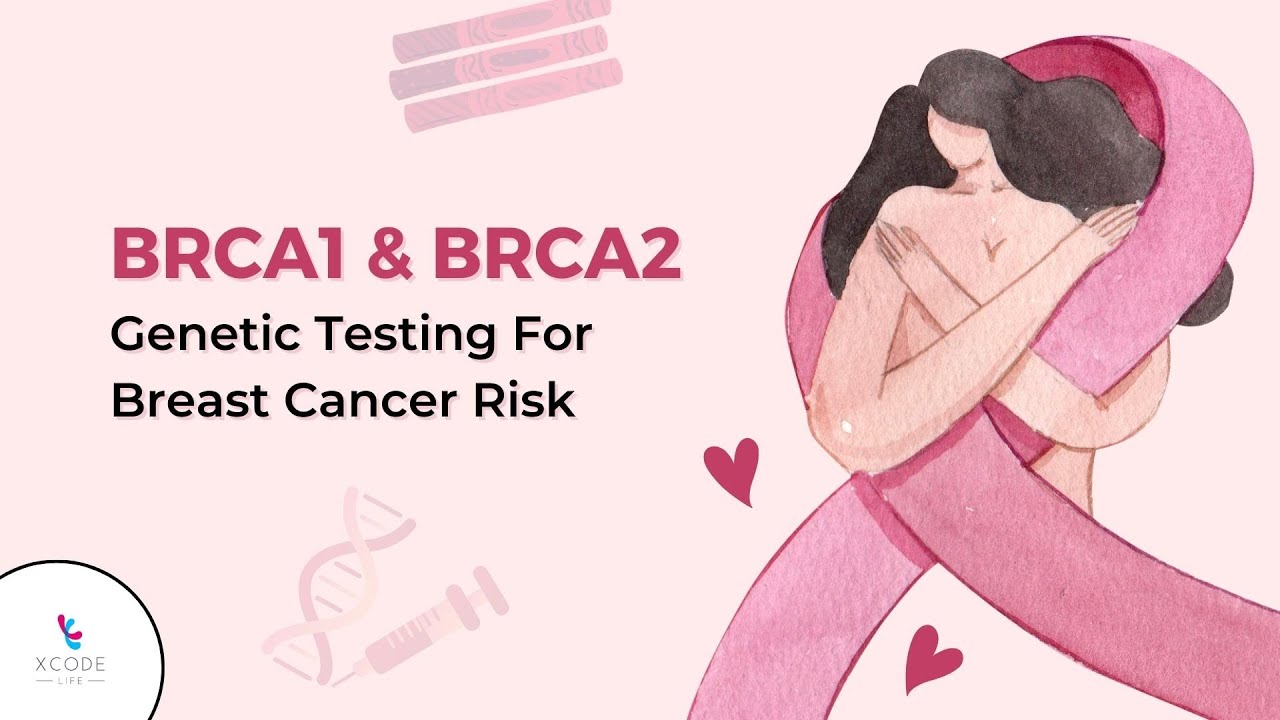Can men get breast cancer? Breast cancer is not just a woman's disease. It can also affect men. In fact, male breast cancer makes up about 1% of all breast cancers diagnosed each year. Although the number of cases is small, it's important for men to be aware of the signs and symptoms of breast cancer so they can seek treatment early. With early detection, the chances of survival are much higher.
Find Out Your Risk For Breast Cancer and Other Cancer With Xcode Life
Breast cancer in men is a rare condition.
<1% of all breast cancer cases occur in men.
According to the Centre for Disease Control, 1 in every 100 breast cancer cases in the United States occurs in men.
Early diagnosis can lead to a better outcome for the disease.
There is a lack of awareness about breast cancer in men, which leads to late diagnosis.
Around 40% of breast cancer cases in men are diagnosed in the third or fourth stage.
This condition affects men and women differently.
Men have a lesser and smaller amount of breast tissue compared to women.
The cancerous lumps are smaller, but there is a higher chance of cancer spreading to other tissues in the body.
What Are The Symptoms of Breast Cancer In Men?
Common symptoms include
- Lump or swelling in the breast
- Redness or scaling of the skin on the breast or nipple
- Nipple retraction, ulceration, or discharge
- Bone pain or swelling in the lymph glands around the underarm area can occur in later stages when cancer spreads
Can Men Get Breast Cancer? The Genetics Angle.
A family history of breast cancer increases the risk of developing breast cancer in men.
About 1 in 5 breast cancer cases in men is hereditary.
The relative risk of breast cancer for a woman who has an affected brother is approximately 30% higher than for a woman with an affected sister.
Abnormal changes or mutations in certain genes result in an increased risk of breast cancer. BRCA1, BRCA2, CHEK2, PTEN, and PALB2 are few genes associated with breast cancer risk in men.
Men with a mutation in the BRCA2 gene have a 7 in 100 chance of developing breast cancer.
Men with a mutation in the BRCA1 gene have a 1 in 100 chance of developing breast cancer.
Xcode Life's Sample Breast Cancer In Men Genetic Report

Non-Genetic Factors that Influence Breast Cancer in Men
Other than genetics, factors that influence breast cancer risk include:
Age
The risk of breast cancer increases with age. According to the CDC, the average age of men diagnosed with breast cancer is 65 years.
Estrogen Levels
Elevated levels of estrogen, one of the two main female sex hormones, contribute to the development of breast cancer.
Certain conditions or treatments can lead to an increase in estrogen levels. These include:
- Men with a rare genetic condition called Klinefelter’s syndrome are born with an extra X chromosome. They have higher levels of estrogen and lower levels of male hormones, which may increase the risk of breast cancer.
- Liver diseases, such as cirrhosis, can lead to changes in hormone levels.
- Estrogen-related drugs used in the treatment of conditions like prostate cancer can increase the risk of breast cancer.
Lifestyle Factors
Being overweight or obese and engaging in low levels of physical activity contribute to the risk of breast cancer. Heavy drinking may also increase breast cancer risk.
Radiation
Men who have undergone radiation treatment to the chest area may be at higher risk of developing breast cancer.
Testicular Conditions
Injury or swelling in the testicles, an undescended testicle, or surgery can increase the risk of breast cancer.
Recommendations To Lower Breast Cancer Risk In Men
Early Detection
Early detection of breast cancer favors early treatment and a better outlook.
This helps prevent the spread of breast cancer to other tissues in the body.
Men with a family history of this condition should undergo regular screening.
Those at a higher risk of developing breast cancer can opt for genetic testing to see if they carry pathogenic variants.
A healthcare provider and a genetic counselor can help you understand risk assessment and the implications of the test.
They can tell you about the pros and cons of the test, your testing options, and further interpret the results and their significance.
Regulating Estrogen Levels
There are several health conditions like hypogonadism that can increase estrogen levels.
Even certain antibiotics can increase estrogen levels.
It is important to consult your doctor for advice regarding lowering your estrogen levels in these cases.
Lifestyle
Staying active, eating healthy, quitting smoking, and cutting down on alcohol can help keep your hormones in check and lower the risk of breast cancer.
Treatment
Treatment options include chemotherapy, radiation, hormone therapy, targeted therapy, and surgery.
Based on the diagnosis, the doctor will prescribe the necessary treatment.
Summary: Can Men Get Breast Cancer?
- Lesser than 1% of all breast cancer cases are found to occur in men. Due to a lack of awareness, it is usually diagnosed in men in the later stages.
- Those with a family history of breast cancer are more likely to develop the disease.
- Certain changes or mutations in some genes, including BRCA1, BRCA2, CHEK2, PTEN, and PALB2, contribute to the development of breast cancer in men.
- Old age, elevated estrogen levels, certain lifestyle factors, prior exposure of the chest area to radiation treatment, and testicular conditions are some of the other risk facors.
- Early detection can lead to a better outlook and prevent cancer from spreading. Staying active and reducing alcohol consumption are some of the lifestyle changes that can help.
- Genetic testing is a good option for males with a family history of breast cancer. A trained healthcare professional or genetic counselor can outline the steps and help you interpret the results.






